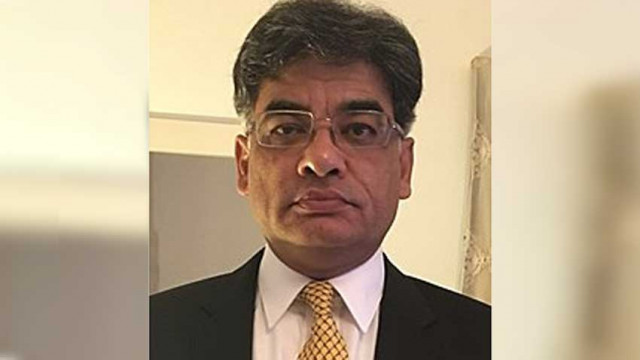Newly-appointed AGP seeks autonomy from law and justice ministry
Khalid Javed Khan also recuses himself from representing government in Justice Isa case

On his first day as attorney general of Pakistan, Khalid Javed Khan pens 3 letters seeking autonomy and clarifications. PHOTO: FILE
The newly-appointed AGP has written to Prime Minister Imran Khan seeking autonomy for the office of the attorney general. He has proposed that the office of the attorney general of Pakistan should be autonomous from the administrative control of the law and justice ministry.
In a letter addressed to the federal law and justice ministry, Khan has sought clarification from Dr Farogh Naseem over new appointments of law officers.
He cited a local newspaper’s report claiming “frantic efforts” appoint top law officers across the country in a bid to “oblige the legal fraternity” scrutinising Naseem over the law ministry’s decisions including the presidential reference against Justice Qazi Faez Isa.
Post-AGP exit: Who will plead presidential reference against Justice Isa?
“You would recall that during our meeting earlier today you had clarified that no such action is in the offing and therefore no law officers are being terminated/appointed,” reads the AGP’s letter. “We had agreed further that we shall be working within the prescribed constitutional limits of our respective office and that no appointments, transfers or other matters relating to the law officers would be taken by the law and justice division without prior consent of the attorney general of Pakistan.”
Noting that the news story had “unnecessarily created confusion regarding the relationship between the law and justice division and the office of the attorney general of Pakistan”, Khan requested Naseem to issue an “appropriate formal clarification”.
“Looking forward to a good working relationship between the law and justice division and the officer of the attorney general within our respective domains,” he emphasised.
The new top law officer has also conveyed to the law and justice ministry that his office will proceed international litigation and now allow interference from the ministry.
Earlier in the day, Khan submitted an application before a full-court bench of the Supreme Court seeking recusal from representing the federal government in Justice Isa's plea against the presidential reference.
AGP ‘forced’ to quit over top court faux pas
The Express Tribune had previously reported that the law minister was not in favour of appointing Khan as the AGP and was trying to convince stakeholders to hire Advocate General Punjab Jamal Sukhaira instead. It has also been learnt that there is an old rivalry between the law minister and Khan over ideological differences.
Khan was vocal against the unconstitutional steps of former military ruler retired General Pervez Musharraf when Naseem was the Sindh advocate general during his regime. He opposed Musharraf’s Provisional Constitution Order and wrote several articles on it.
However, PM Imran had made up his mind to appoint the Karachi-based lawyer who also served as the AGP during the last caretaker setup.
Khan's professional career spans over two decades. He enrolled as a high court advocate in 1991 and became an advocate of the Supreme Court in 2004. His father, Prof ND Khan, has remained associated with the PPP for a long time.
Khan has served as legal adviser to the AGP, and in this capacity, advised Benazir Bhutto on legal matters during her second tenure (1993-1996) as the prime minister. He obtained a law degree from the London University, a BCL Bachelor of Civil Law) degree from Oxford University and LLM from the Harvard University. He completed his bar-at-law from Lincoln’s Inn.



















COMMENTS
Comments are moderated and generally will be posted if they are on-topic and not abusive.
For more information, please see our Comments FAQ